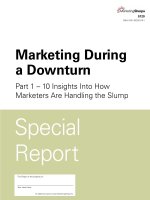MARKETING DURING A DOWNTURN: INSIGHTS INTO HOW MARKETERS ARE HANDLING THE SLUMP pot
Bạn đang xem bản rút gọn của tài liệu. Xem và tải ngay bản đầy đủ của tài liệu tại đây (1.67 MB, 22 trang )
© Copyright 2008 MarketingSherpa Inc. It is forbidden to reproduce (except for private use), transform, communicate publicly, make available to the
public the contents of this report. For permissions, contact
1
$129
ISBN: 978-1-932353-76-1
Marketing During
a Downturn
Part 1 – 10 Insights Into How
Marketers Are Handling the Slump
Special
Report
This Report is the property of:
For additional copies contact MarketingSherpa Inc.
Your name here
MarketingSherpa Special Report: Marketing During a Downturn
© Copyright 2008 MarketingSherpa Inc. It is forbidden to reproduce (except for private use), transform, communicate publicly, make available to the
public the contents of this report. For permissions, contact
2
MarketingSherpa’s Marketing During
a Downturn
US $129 / ISBN: 978-1-932353-76-1
Copyright © 2008 by MarketingSherpa Inc.
All rights reserved. No part of this report may be reproduced or transmitted in any form or by any
means, electronic or mechanical, including photocopying, recording, faxing, emailing, posting online
or by any information storage and retrieval system, without written permission from the Publisher.
To purchase additional copies of this report, please visit
Yes, bulk discounts are available for multiple copies. Contact:
Customer Service
MarketingSherpa Inc.
+1 (877) 895-1717 (outside US call +401-247-7655)
499 Main St.
Warren, RI 02885 USA
MarketingSherpa Special Report: Marketing During a Downturn
© Copyright 2008 MarketingSherpa Inc. It is forbidden to reproduce (except for private use), transform, communicate publicly, make available to the
public the contents of this report. For permissions, contact
3
Contents
Dealing with an Economic Downturn 4
Chart 1: Downturn-Related Changes to Marketing Budget by Company Size 5
Insight #1. Large Firms Are Cutting Budgets the Most 5
Insight #2. Small Firms ‘Cautiously’ Grow Budgets 6
Chart 2: Effect of Downturn on Marketing Tactics – Brand vs. Direct Marketing 7
Insight #3. Marketers Return to Direct Marketing 7
Chart 3: CFOs’ Attitudes Toward Budgets During Economic Slowdown 8
Insight #4. Some in Finance Department Eye an Opportunity 8
Chart 4: Effect of Downturn – B-to-B vs. B-to-C 9
Insight #5. Consumer Marketers Feel Effects More Than Others 10
Chart 5: Effect of Downturn by Company Size 11
Insight #6. Sales Cycles Are Lengthening 11
Chart 6: Effect of Downturn on Marketing Tactics – Traditional vs. Online 12
Insight #7. Marketers Boost Online Spending 13
Chart 7: Effect of Downturn on Online Tactics 14
Insight #8. Emails to House List and Web 2.0 See Biggest Lift 14
Chart 8: Effect of Downturn on Traditional Tactics 15
Insight #9. TV and Radio Ads Get Largest Cut 15
Insight #10. Direct Mail, Telemarketing and Event Marketing Increase 15
Taking the Next Steps
16
Survey Methodology 17
Resources 18
Past MarketingSherpa articles 18
Other resources 18
Useful links related to this article 19
MarketingSherpa Special Report: Marketing During a Downturn
© Copyright 2008 MarketingSherpa Inc. It is forbidden to reproduce (except for private use), transform, communicate publicly, make available to the
public the contents of this report. For permissions, contact
4
By now, you’ve read the headlines. You’ve seen the stock market’s decline. You know
consumer spending is down. You’ve seen articles about the Bear Stearns sale – a result of
last year’s subprime mortgage financial crisis – and the forecasts of more bad economic
news to come.
You might also know that when the economy heads south, marketing lands on the
chopping block. Historically, marketing budgets are among the first to get cut in a budget
crunch. And economic downturns give new meaning to the words “survival of the fittest.”
What you might not know:
• Marketers are already feeling the effects.
Gap, the apparel retail company, reported in Brandweek that it is shelving its spring
television campaign and rethinking other marketing spend after a disappointing fourth
quarter.
• Companies are cutting marketing budgets.
60% of large companies, for example, reported a cut has been made this year or is
expected, according to a new MarketingSherpa survey of 407 marketing professionals.
• Marketers are preparing their contingency strategies.
What are you doing? You are shifting spend from traditional tactics to online tactics,
according to our survey. You are spending more on direct marketing and less on
branding. You are definitely spending more on tactics with proven ROI and/or
measurable ROI.
Something else you might not know: Not all marketers are thinking the worst.
“Heavier investing in direct mail and online is working well since many competitors are
reducing marketing investments, and our collective share of voice is increasing our sales,”
wrote one of our survey respondents.
“I can’t believe how many good leads I have in the pipeline – way more than usual,” wrote
another survey respondent from a search marketing firm. “All I can figure is that marketers
are having to be smarter about where they spend their money.”
Read on if you want more of the big picture… and some practical tips for dealing with a
downturn.
Dealing with an Economic Downturn
MarketingSherpa Special Report: Marketing During a Downturn
© Copyright 2008 MarketingSherpa Inc. It is forbidden to reproduce (except for private use), transform, communicate publicly, make available to the
public the contents of this report. For permissions, contact
5
Chart 1: Downturn-Related Changes to Marketing Budget by Company Size
Insight #1. Large Firms Are Cutting Budgets the Most
Is anyone seeing a smaller marketing budget just yet? Yes – 60% of marketers at larger
companies and 29% of medium-sized companies have already cut or expect to cut their
marketing budgets. Small companies are an exception – only 13% reported cuts or
expected cuts.
This shouldn’t come as much of a surprise. Typically, budgets for smaller companies
aren’t as big and, therefore, these marketers don’t have as much to cut in the event of a
downturn. Because large companies usually spend more on marketing, it makes sense
that they identify marketing as a place to cut corners.
A plurality of our survey respondents, 39%, said that their marketing budgets have not
been affected by the downturn yet.
Small businesses were the highest in the “no change” category; 52% of those
respondents said their budgets would not change this year. Mid-sized businesses followed
with 46% not changing their budgets.
MarketingSherpa Special Report: Marketing During a Downturn
© Copyright 2008 MarketingSherpa Inc. It is forbidden to reproduce (except for private use), transform, communicate publicly, make available to the
public the contents of this report. For permissions, contact
6
The “no change” attitude could exist for any number of reasons. Lars Hundley, for
example, hasn’t noticed a change in buying patterns. And he isn’t touching his marketing
budget. He’s hopeful that his small eretail company, Clean Air Gardening, which sells
environmentally friendly lawn and garden tools online, will continue to do well during a
slowing economy because of society’s heightened awareness of green living.
Tip: Spend more on media dollars, less on overhead
When you have less to work with, make sure you spend as much of your budget as
possible in actual media dollars, says Jay O’Connor, Sr. VP Worldwide Marketing, NetSuite
Inc., a large business management software company. That includes email marketing,
direct mail and advertising.
“Make sure you’re not spending too much of your budget on marketing overhead that
doesn’t translate into impressions and messaging that prospects will actually see,”
O’Connor says. “Spending too much of your budget on overhead isn’t going to drive
revenue.”
O’Connor also says that marketers should rethink their spending on agencies and on
creative, especially if they could reallocate that money to getting their message out there.
“In a tight environment you need current results, not long-term results.”
Insight #2. Small Firms ‘Cautiously’ Grow Budgets
More small companies are increasing their marketing budgets. About 34% of marketers
at small companies compared to 25% of medium-sized companies and 21% of large
companies reported increases or expected increases.
This disparity could be because smaller companies are still growing and need to grow
marketing to gain market share. Many mid-sized companies are in growth mode as
well. Executives at Indicative Software, for example, are increasing the medium-sized
IT management software company’s marketing budget this year because “we’re an
emerging growth company,” says Angela Tucci, VP Marketing.
But, even with the increase, Tucci’s department is spending a little more cautiously. “We’re
going to dribble a little more than going for the big bang.”
MarketingSherpa Special Report: Marketing During a Downturn
© Copyright 2008 MarketingSherpa Inc. It is forbidden to reproduce (except for private use), transform, communicate publicly, make available to the
public the contents of this report. For permissions, contact
7
Chart 2: Effect of Downturn on Marketing Tactics – Brand vs. Direct Marketing
Insight #3. Marketers Return to Direct Marketing
30% of survey respondents said they are increasing direct marketing investments this
year in response to economic conditions. Only 19% are increasing brand investments.
Direct marketing is more measurable and trackable in terms of ROI. It also aims to get the
company’s name, brand and message in front of as many eyes as possible. Marketers are
putting more money into direct marketing because “they’re getting smarter,” says David
Sable, Vice Chairman and CEO, Wunderman, a large consumer-focused marketing agency.
More and more recognize that they don’t need to separate branding and direct marketing
budgets because they can acquire and brand at the same time, Sable says. Additionally,
some of the increase in direct marketing spend could be coming from branding budgets.
Marketers are cutting their spending on branding (49%) at a higher rate than on direct
marketing (37%).
MarketingSherpa Special Report: Marketing During a Downturn
© Copyright 2008 MarketingSherpa Inc. It is forbidden to reproduce (except for private use), transform, communicate publicly, make available to the
public the contents of this report. For permissions, contact
8
Chart 3: CFOs’ Attitudes Toward Budgets During Economic Slowdown
Insight #4. Some in Finance Department Eye an Opportunity
It seems as though most CFOs are heeding experts’ top advice for marketing in a
downturn: don’t panic, now is NOT the time to cut back on marketing. More than half of
executive management respondents, 51.3%, said their attitude toward marketing budgets
was either, “no change” or “invest.”
One survey respondent wrote: “Those organizations that cut back on their marketing
budgets in tough economic times are hurting themselves.” Another wrote, “If feasible,
increase marketing spend to gain a larger voice in your marketplace as your competitors
cut back.”
Still, a large group of CFOs, 43.3%, said the first place to cut in a downturn is marketing.
Most middle managers, about 65%, prefer no change. Only about 25% of middle
managers agreed that marketing is the first place to cut.
But if your CFO says, “Cut it!,” here’s a tip for justifying your spend.
MarketingSherpa Special Report: Marketing During a Downturn
© Copyright 2008 MarketingSherpa Inc. It is forbidden to reproduce (except for private use), transform, communicate publicly, make available to the
public the contents of this report. For permissions, contact
9
Tip: Let numbers do the fighting for you
“It’s a real simple conversation with the CFO about whether to maintain current spending
or increase spending if you have bulletproof numbers on the revenues and ROIs of
marketing programs,” O’Connor says.
He’s talking about real data that shows, for example, not just how many clickthroughs
you got on that banner ad campaign but how much actual revenue was generated for the
company as a result. “If you can’t prove the results you’re going to deliver then you’re at
risk of having your budget cut because your spend can be seen as discretionary.”
Takeaway: If you don’t have a way to measure the ROI from marketing campaigns and
programs, now would be the time to invest.
Chart 4: Effect of Downturn – B-to-B vs. B-to-C
MarketingSherpa Special Report: Marketing During a Downturn
© Copyright 2008 MarketingSherpa Inc. It is forbidden to reproduce (except for private use), transform, communicate publicly, make available to the
public the contents of this report. For permissions, contact
10
Insight #5. Consumer Marketers Feel Effects More Than Others
Economic factors are already hitting the business-to-consumer realm much more than the
business-to-business sector. More than 50% of B-to-C responders reported that they are
seeing lower numbers of total and new customers per month, and the cost of acquisition
increasing.
This isn’t surprising, considering that the B-to-C sector, namely retail and financial
services, are usually the first to get hit when a downturn occurs. Consumers are less likely
to spend on items that aren’t a necessity.
Tip: Align messaging with pain points
• Fine-tune messaging to emphasize value, cost savings
• Rework website content to better communicate value
• Be specific about what clients can expect for their investment
• Emphasize free trials, special discounts
• Emphasize customer testimonials centered on increased revenue
Tip: Don’t forget about your customers
Even when consumers are spending less, keep in contact with them. Make sure they
know you haven’t forgotten them. Keep sending them direct mail and emails. Keep
advertising.
If you have a retail store, for example, hold a private sales event for best customers,
says Wunderman’s Sable. Remember that it’s more cost-effective to market to existing
customers than it is to get new ones, especially in a downturn.
“Even if they’re not buying today, it doesn’t mean they won’t buy tomorrow,” he says.
MarketingSherpa Special Report: Marketing During a Downturn
© Copyright 2008 MarketingSherpa Inc. It is forbidden to reproduce (except for private use), transform, communicate publicly, make available to the
public the contents of this report. For permissions, contact
11
Chart 5: Effect of Downturn by Company Size
Insight #6. Sales Cycles Are Lengthening
A sizable number of medium-sized companies, 60%, are seeing increasing sales cycles.
Even small companies are noticing this more than other measures.
Additionally, a decent number of B-to-B and B-to-C marketers, 47% and 43%, reported
a longer sales cycles (see chart #4). B-to-B marketers, in particular, are observing a
lengthening sales cycle more than any other measure.
Tip: If you can increase the volume going into your pipeline now, do it.
A lengthening sales cycle is one of the first things to happen in the event of a downturn,
says Scott Gillum, Sr. VP Financial Services, MarketBridge, a mid-sized marketing agency
for several Fortune 500 companies.
MarketingSherpa Special Report: Marketing During a Downturn
© Copyright 2008 MarketingSherpa Inc. It is forbidden to reproduce (except for private use), transform, communicate publicly, make available to the
public the contents of this report. For permissions, contact
12
To combat that lengthening, “marketers need to have a very good view of their pipeline
and the historical performance of their pipeline,” he says. “If you know you needed 10
deals to make your revenue target last year, you’re going to want to have at least 20
opportunities identified.”
Tip: Test, test, test
NetSuite has used multivariate testing tools to improve form conversion and Web page
conversion, O’Connor says. It involves real-time A/B split tests for different headlines,
graphics and copy, often performed simultaneously.
“We’ve known that to be a good way to improve our results without spending more
money,” he says.
Chart 6: Effect of Downturn on Marketing Tactics – Traditional vs. Online
MarketingSherpa Special Report: Marketing During a Downturn
© Copyright 2008 MarketingSherpa Inc. It is forbidden to reproduce (except for private use), transform, communicate publicly, make available to the
public the contents of this report. For permissions, contact
13
Insight #7. Marketers Boost Online Spending
It’s pretty clear that marketers are investing more in online tactics than in traditional
methods. Although most respondents aren’t changing budgets for either, 38% are
increasing online investment while 36% are decreasing investment in traditional tactics.
Only 17% of respondents are decreasing spend for online tactics while 25% are
increasing investment in traditional tactics.
Marketers could be investing more online because it’s less expensive and easier to
measure ROI than it is for traditional tactics.
“We definitely reallocated spend over the years, including post-9/11 and post-dot-com
bust, to spending our money on what generated the highest ROI,” O’Connor says. “We
used to do more print advertising. We used to do a lot of events and trade shows.”
But during the last recession, NetSuite shifted its spend toward trackable online tactics,
including paid search, natural search and email marketing.
Attendance to online and in-person events also remains strong. Fewer than a third of
respondents from small, medium and large companies are experiencing a decrease in
attendance to virtual or in-person events (see chart #5). That’s good news for marketers
getting successful conversion rates from online events, such as webinars.
Tip: Invest more in online events
Indeed, online events will experience higher attendance levels than in-person events
during a downturn, says Gillum. Attending an online event costs little more than the
time of the person attending. Sending employees to an event could require sizable
transportation, hotel and food costs.
Chart #7, which breaks down tactic by tactic how economic conditions are affecting online
spending decisions, suggests that most marketers aren’t changing their budgets for
things like online display ads, email marketing to rented lists and paid search. In fact, more
marketers are increasing budgets for these tactics than decreasing them. (For more on
event marketing, see Insight #10.)
The three tactics experiencing the greatest cuts in spending are the most expensive of
the group. Spending for online display ads is shrinking by 26%; paid search, 13%; email to
rented lists, 12%.
MarketingSherpa Special Report: Marketing During a Downturn
© Copyright 2008 MarketingSherpa Inc. It is forbidden to reproduce (except for private use), transform, communicate publicly, make available to the
public the contents of this report. For permissions, contact
14
Chart 7: Effect of Downturn on Online Tactics
Insight #8. Emails to House List and Web 2.0 See Biggest Lift
More than half (53%) of respondents are investing more in email marketing to house lists.
Only 6% are spending less on this tactic. Likewise, 47% are increasing spend on Web 2.0
strategies; only 8% are decreasing spend.
The low costs associated with these two tactics are probably one reason. Lisa Mathisen,
Owner, Realm Dekor, a small online home décor/gift store, is quite happy with email. “It
costs maybe 3 cents per email,” she says. “It’s very, very cost effective.”
Tip: Build your email newsletter subscriber list by offering incentives
• Discounts
• Free shipping
• Free gift wrap
Web 2.0 tactics could be seeing an increase because most cost little more than the cost
of time to implement and upkeep. It doesn’t cost anything else for Mathisen to post daily
updates on her company’s blog and to link to bloggers who might post comments about
her products, something that improves her company’s natural search ranking.
MarketingSherpa Special Report: Marketing During a Downturn
© Copyright 2008 MarketingSherpa Inc. It is forbidden to reproduce (except for private use), transform, communicate publicly, make available to the
public the contents of this report. For permissions, contact
15
Chart 8: Effect of Downturn on Traditional Tactics
Insight #9. TV and Radio Ads Get Largest Cut
Marketers are spending less on radio/TV ads, which confirms the notion that they are
investing less on traditional, branding types of marketing tactics. TV and radio are also
notoriously expensive; therefore, they are a natural first category to cut.
Only 7% of respondents are increasing investment in this area: 33% are not changing
investment while 59% are decreasing it.
Print advertising is also experiencing a decrease – 44% of respondents report some or
significant cuts in spending. Only 4% are increasing their investment in print.
Insight #10. Direct Mail, Telemarketing and Event Marketing
Increase
As mentioned in Insight #3, marketers will rely on direct marketing tactics quite heavily
this year. Event marketing is experiencing the greatest increase, with 42% of respondents
reporting a hike. Telemarketing is next with 40%, and direct mail follows with 29%.
MarketingSherpa Special Report: Marketing During a Downturn
© Copyright 2008 MarketingSherpa Inc. It is forbidden to reproduce (except for private use), transform, communicate publicly, make available to the
public the contents of this report. For permissions, contact
16
When the economy slows, marketers start feeling the pressure to invest more in tactics
that show better ROI, such as direct mail and telemarketing, Gillum says. “Marketers are
going after better measurement for their dollars.”
Still, at least one-third of respondents in each category aren’t changing their budgets at all.
The highest constant by far is in print advertising (51%).
Taking the Next Steps
Now that you know where marketers stand on issues like budget, tactics and effects of
the downturn, find out what strategies they are implementing to counteract these effects.
Some marketers are rethinking their license agreements, for instance, and changing
them from perpetual to term-based. Others are seeking out cost-per-acquisition payment
models versus cost-per-thousand impression models for online ads. Another survey
respondent says: “Use lower prices [plus] more and better “risk-free” offers (money back
guarantee), longer trial periods, etc. In general, [it’s] a good time to get a greater market
share.”
The second half of this special report offers practical information you can use to ride out an
economic downturn. And plenty of strategies you can implement that can land you above
your competitors when the economy strengthens again.
MarketingSherpa Special Report: Marketing During a Downturn
© Copyright 2008 MarketingSherpa Inc. It is forbidden to reproduce (except for private use), transform, communicate publicly, make available to the
public the contents of this report. For permissions, contact
17
Survey Methodology
This MarketingSherpa survey was responded to by 407 marketers:
• 36% from the professional service sector
• 25% from consumer products
• 16% from consumer services
• 15% business-to-business
• 8% other
Of the respondents:
• 64% work at companies with fewer than 50 employees
• 25% work at companies with 50 to 1,000 employees
• 11% work at companies with more than 1,000 employees
• 41.52% are executive management
• 23.47% are middle management
• 16.61% are executive directors
• 13% are execution staff
• 6% are other
81% of respondents are from the US and Canada, with the rest spread evenly among the
UK, Ireland, Europe, Asia and ‘Elsewhere.’
Purchase order power of respondents:
• Not sure/Doesn’t apply, 27.65%
• Under $50,000, 25.26%
• $50,000 to $99,000, 12.63%
• $100,000 to $499,999, 19.11%
• $500,000 to $999,999, 5.80%
• $1 million or more, 9.56%
MarketingSherpa Special Report: Marketing During a Downturn
© Copyright 2008 MarketingSherpa Inc. It is forbidden to reproduce (except for private use), transform, communicate publicly, make available to the
public the contents of this report. For permissions, contact
18
Resources
Past MarketingSherpa articles
Recession-Beating Marketing - Glories of Opt-in Checkbox Barters:
/>Recession as Marketing Bonanza - a Contrarian (Yet Realistic) View:
/>PR in a Recession - CEO Fantasies & Case Studies:
/>How to Market Subscriptions During a Down Economy: 6 Strategies That Will Bring
Double-Digit Growth:
/>How iVillage Is Positioning Itself to Profit (As Soon as the Economy Gets a Little Better):
/>Top 3 Low-Cost, High-Impact B-to-B Online Marketing Tactics for the New Economy:
/>Two Tactics Hobart Uses to Defy the Recession: 400 Customer Testimonials and 0%
Financing:
/>Oakwood Uses Advanced Web & Email Tactics to Survive the Recession on a Smaller
Marketing Budget:
/>How Bankrate Kept Online Ad Revenues Steady Despite the Economy:
Other resources
MediaPost’s Email Insider – Your Email Marketing Recession Survival Guide:
/>TechnoBuzz – Preparing to Market Technology in an Economic Downturn:
/>MarketingSherpa Special Report: Marketing During a Downturn
© Copyright 2008 MarketingSherpa Inc. It is forbidden to reproduce (except for private use), transform, communicate publicly, make available to the
public the contents of this report. For permissions, contact
19
RoughStock – Recession-Proof Marketing:
/>
recession-proof-marketing.html
Marketing Productivity – Marketing into a Downturn:
/>Useful links related to this article
Clean Air Gardening:
Indicative Software:
MarketBridge:
NetSuite:
Realm Dekor:
/>Wunderman:
MarketingSherpa Special Report: Marketing During a Downturn
© Copyright 2008 MarketingSherpa Inc. It is forbidden to reproduce (except for private use), transform, communicate publicly, make available to the
public the contents of this report. For permissions, contact
20
MarketingSherpa Inc. is a research firm publishing Case Studies, benchmark data,
and how-to information read by hundreds of thousands of advertising, marketing and
PR professionals every week.
Praised by The Economist, Harvard Business School’s Working Knowledge Site, and
Entrepreneur.com, MarketingSherpa is distinguished by offering practical, results-
based marketing information researched and written by a staff of in-house reporters.
MarketingSherpa’s publications, available at www.MarketingSherpa.com, include:
• 840+ Case Studies on marketing from Agilent Technologies to
Xerox, searchable by company or topic.
• Annual Benchmark Guides featuring primary research and collected
“best of” secondary research on statistics related to search
marketing, email marketing, ecommerce and business technology
marketing.
MarketingSherpa Newsletters
Visitors to MarketingSherpa.com may sign up for their choice of nine newsletters,
including: specific Case Studies for business-to-business and business-to-
consumer marketers, email-focused Studies and Career Climber – the best way to
find a great marketer or a great marketing job.
Sign up for newsletters at www.MarketingSherpa.com.
MarketingSherpa Summits
MarketingSherpa also hosts annual Summits. This year’s include:
• Selling Online Subscriptions Summit ’08 – May 12-13, 2008 – New York City , NY
• Web Optimization Summit ‘08 – September 2008 – Orlando , FL
• B-2-B East Coast 2008 Summit – October 5-7, 2008 – Boston , MA
• B-2-B West Coast 2008 Summit – October 26-28, 2008 – San Francisco , CA
• B-to-C Demand Generation 2008 Summit – November 2008 – New York City, NY
• Email Summit ’09 – March 15–17, 2009 – Miami , FL
Contact MarketingSherpa:
Customer Service available M-F, 9-5 (ET)
(877) 895-1717 (outside the U.S. call 401-247-7655)
About MarketingSherpa Inc.
Best-of Weekly-
100 Case Studies and 50
book contest giveaways
per year, hotlinks to the
week’s research, awards
and jobs.
Get the Weekly:
• Business-to-Business Marketing
• Marketing to Consumers Online
• Great Minds: Interviews
• Fame: Awards & Speaking Gigs
• Email Marketing
• ContentBiz:
Online Pub. Industry
• Job Classifieds
• SherpaStore Newsletter
• Chart of the Week
Or choose by topic:
MarketingSherpa Special Report: Marketing During a Downturn
© Copyright 2008 MarketingSherpa Inc. It is forbidden to reproduce (except for private use), transform, communicate publicly, make available to the
public the contents of this report. For permissions, contact
21
Practical Reports For You From MarketingSherpa
For more information, contact Customer Service at (877) 895-1717 or
MarketingSherpa Landing Page Handbook 2008
Newly updated and expanded for 2008, MarketingSherpa’s
bestselling Landing Page Handbook helps you raise conversions
by up to 55% or more for search, email, and ad campaigns for
lead generation, ecommerce, and even blogs. Includes: page
design & copy instructions; 54 stat & data charts; 114 samples of
landing pages to copy; help for search, email, B-to-B, ecommerce,
blogs & lead generation conversions
273 pages. Published November 2007 by MarketingSherpa; $497
for instant PDF download plus printed copy!
Coming Soon! Business Technology Marketing
Benchmark Guide 2008-09
• Thousands of B-to-B marketers and business tech
buyers surveyed
• Practical data on search, email, PR, direct mail, lead
generation, trade shows, podcasting, telemarketing,
& budgeting
Publish Date - June 2008; PRICE: $397
MarketingSherpa Online Advertising Handbook +
Benchmarks
Part Handbook, Part Benchmarks – All new and practical to make
sure you maximize the effectiveness of your Online Advertising.
Includes: fact-based data for online advertising strategy, tactics,
and general know-how; 577 advertisers and marketers surveyed;
common sense design and scientific targeting; 30 Images/
Creative Samples; 116 Tables and Charts
213 pages. Published March 2008 by MarketingSherpa; $497 for
instant PDF download plus printed copy!
MarketingSherpa Special Report: Marketing During a Downturn
© Copyright 2008 MarketingSherpa Inc. It is forbidden to reproduce (except for private use), transform, communicate publicly, make available to the
public the contents of this report. For permissions, contact
22
MarketingSherpa Email Marketing Benchmark
Guide 2008
Complete with all new research, Marketing Sherpa’s fifth annual
Email Marketing Benchmark Guide delivers the fact-based data
you need to compare your Email campaigns with others. Includes:
Results from in-depth survey of 1,210 marketers with hands-on
Email experience; 260 charts, 12 images and 9 new eyetracking
heatmaps + 4 new special reports
328 pages. Published December 2007 by MarketingSherpa; $347
for instant PDF download plus printed copy!
Practical Reports For You From MarketingSherpa
For more information, contact Customer Service at (877) 895-1717 or
MarketingSherpa Ecommerce Benchmark Guide 2007
Practical ecommerce data to help you improve shopper-to-buyer
conversions. All-new Guide features: 98% new content; 223 charts &
tables; 1,913 ecommerce marketers own data; Survey results from
heatmaps 2,449 online shoppers; New eyetracking incl. Best Buy, Circuit
City & Wal-Mart
294 pages. Published March 2007 by MarketingSherpa; $297 for instant
PDF download plus printed copy!
MarketingSherpa Search Marketing Benchmark
Guide 2008
New handy guide gives you: 2,475 search marketers surveyed;
184 charts & tables +10 eyetracking heatmaps; 711 search
marketing agency execs and staff surveyed; growth rates and ROI
of search marketing vs. other marketing tactics; stats on costs per
click, conversion rates, SEO vs. PPC, and more.
275 pages. Published September 2007 by MarketingSherpa; $297
for instant PDF download plus printed copy!









